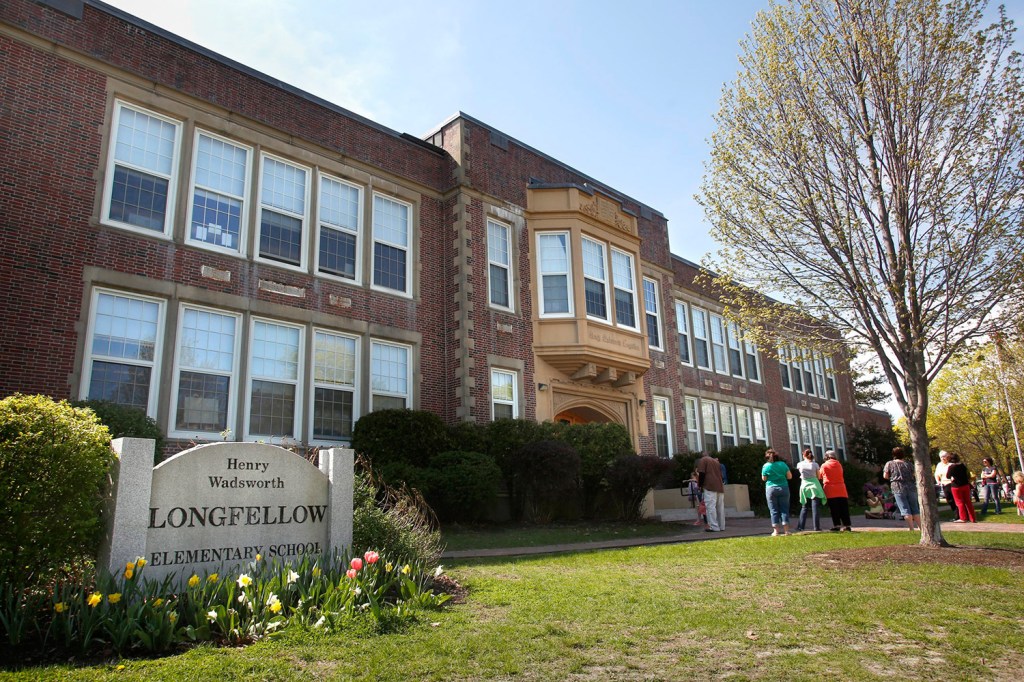The Portland City Council voted 8-1 Monday night to give voters a choice on how they want to fund renovations in as many as four elementary schools.
In November, voters will choose between a $64 million bond that would use local tax dollars to renovate four schools, and a $32 million bond to renovate two schools while seeking state funding for the others.
A majority vote is needed at the ballot box to authorize a bond. If both questions receive more than 50 percent of the vote, the question withmore “yes” votes will win. If both get a majority and the same number of “yes” votes, the question with fewer “no” votes will be enacted.
Mayor Ethan Strimling said the council’s action was “a springboard” toward accomplishing what he described as his top priority: asking voters to approve borrowing for renovations at the Lyseth, Longfellow, Presumpscot and Reiche elementary schools.
“We find ourselves in a place to make a compromise to get to where we want to get,” said Strimling.
Monday night’s action, which followed another long public hearing, ends a standoff within the council.
Last month, the full $64 million bond fell one vote short of being placed on the ballot. To get on the ballot, a bond needs support from seven of the council’s nine members, including the mayor.
Councilors Jill Duson, Nicholas Mavodones and Belinda Ray opposed the $64 million proposal, largely because it would eliminate the prospect of state funding for one or more schools.
Mavodones and Duson advocated for a $32 million bond to fix Lyseth and Presumpscot, while seeking state funding for Reiche and Longfellow, both of which narrowly missed the cut in the last round of funding. If state funding were denied, they said, they would support another bond in the future.
“I understand folks simply don’t believe the state is going to give us a nickel,” Duson said before pointing to the amount of income and sales taxes the city sends to Augusta. “I think we have to apply. We have to try to bring Portland dollars back to Portland. This is not (the state’s) money.”
On March 31, Strimling and Mavodones announced that they had reached a compromise to put both bond packages to the voters in November, and Monday night’s action by the council affirmed their agreement.
The council voted 8-1 to add the $32 million bond to the ballot. Councilor Spencer Thibodeau opposed the move.
“This will be the last time I will be voting for this proposal,” Strimling said, shifting into campaign mode. “Councilor Mavodones, you will forgive me, but I will do everything I can to defeat it at the ballot box.”
Separately, the council voted 8-1, with Ray opposed, to put the $64 million bond on the ballot.
Ray proposed a $25 million bond, but only Mavodones supported adding it as a third option on the November ballot.
The votes came after a nearly 90-minute public hearing.
Supporters of the four-school bond were upset that three councilors could so affect the process.
“I am frustrated that this very deliberate process has been thrown for a loop,” said Jeanne Swanton, a West End parent. “I’m just blown away that councilors can come at the eleventh hour and offer their own proposal.”
School board member Marnie Morrione said it was “a joke” for councilors to claim that the $32 million bond could achieve the same result in the same time as a four-school bond.
Others accused the minority councilors of deliberately trying to confuse voters and tilt the scales against the $64 million bond. They noted that “yes” votes on both questions would essentially cancel each other out.
A few speakers urged the council to exercise fiscal restraint, worried about increasing property taxes and the potential need to cut the school budget in the future to pay off the bond.
The $64 million would be borrowed over six years, resulting in an additional $92 million in debt after interest. The bond would increase taxes by 3.1 percent over a 26-year period. That would increase taxes by an average of $104 a year on a $240,000 home, $2,700 over the life of the bond.
The tax impact of the $32 million bond would be roughly half that.
Randy Billings can be contacted at 791-6346 or at:
Send questions/comments to the editors.




Success. Please wait for the page to reload. If the page does not reload within 5 seconds, please refresh the page.
Enter your email and password to access comments.
Hi, to comment on stories you must . This profile is in addition to your subscription and website login.
Already have a commenting profile? .
Invalid username/password.
Please check your email to confirm and complete your registration.
Only subscribers are eligible to post comments. Please subscribe or login first for digital access. Here’s why.
Use the form below to reset your password. When you've submitted your account email, we will send an email with a reset code.